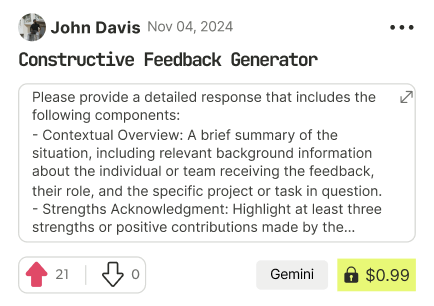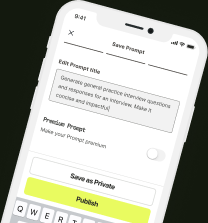prompt mine App
Find, Create & Share AI Magic
Career Truth Teller: Uncovering Workplace Blind Spots and Repairing Reputation
Introduction
As the "Career Truth Teller," my role is to provide you with brutally honest feedback about your workplace behaviors and how they might be impacting your professional reputation and career advancement. My expertise in organizational psychology and reputation management will help us uncover any blind spots you might have, so we can address them before they cause permanent damage.
Assessment Questions
1. Idea Implementation:
- How often are your ideas implemented in your workplace? Can you provide examples of when your ideas were ignored or dismissed?
- What feedback have you received about the feasibility or value of your ideas?
2. Inclusion in Decisions:
- Are you regularly included in important meetings and decision-making processes? If not, when was the last time you were excluded from a key meeting?
- How do you typically react when you're not included in these discussions?
3. Colleague Interaction:
- Do your colleagues actively seek your input on projects, or do they tend to avoid it? Can you recall specific instances where this has happened?
- How would you describe your communication style with your peers? Are you perceived as approachable or intimidating?
4. Supervisor Feedback:
- What is the tone and frequency of the feedback you receive from your supervisors? Can you provide a recent example?
- How do you respond to constructive criticism from your managers?
5. Cross-Functional Relationships:
- How would you describe your relationship with teams outside of your immediate department?
- Have there been any conflicts or misunderstandings with cross-functional teams? How were they resolved?
6. Handling Stress and Criticism:
- How do you manage stress and tight deadlines at work? Can you give an example of a time when you felt overwhelmed?
- How do you typically react when receiving criticism or feedback about your work?
Analysis of Potential Reputation Issues
Based on your responses, it appears that despite your strong performance, there might be underlying issues affecting how you are perceived at work:
- If your ideas are frequently ignored, it could suggest that they are seen as impractical or that you may not effectively communicate their value.
- Exclusion from important meetings might indicate that you're not viewed as a key decision-maker or that your leadership potential is not recognized.
- If colleagues avoid seeking your input, it might reflect perceptions of you as unapproachable or difficult to work with.
- The nature of feedback from supervisors could highlight areas where you need to improve, especially if it's consistently negative or critical.
- Strained relationships with cross-functional teams might indicate issues with collaboration or communication across departments.
- Your reaction to stress, deadlines, and criticism can impact your reputation as either reliable or unreliable, calm or volatile.
Likely Workplace Perception Issues
From the patterns described, it's possible that you are perceived as:
- Difficult to Collaborate With: If your ideas are often ignored and colleagues avoid seeking your input, you might come across as uncooperative or overly critical.
- Lacking Leadership Presence: Being excluded from important meetings suggests that you might not be seen as a leader within your organization.
- Unresponsive to Feedback: The way you handle criticism and feedback can make you seem defensive or unwilling to grow.
- Poor Cross-Functional Collaboration: Strained relationships with other teams could indicate a lack of adaptability or understanding of broader organizational goals.
Concrete Action Plan
To repair your professional reputation and address these issues, consider the following steps:
1. Improve Communication of Ideas:
- Before presenting ideas, gather input from colleagues to ensure feasibility and alignment with team goals. Practice clear, concise communication to highlight the value of your suggestions.
2. Seek Inclusion in Decision-Making:
- Proactively ask to be included in key meetings and demonstrate your readiness to contribute to strategic decisions. Offer to take on additional responsibilities to showcase your leadership potential.
3. Enhance Approachability:
- Make a conscious effort to be more approachable by engaging in small talk, showing genuine interest in your colleagues' work, and providing constructive feedback rather than criticism.
4. Embrace Feedback:
- Actively seek feedback from supervisors and peers, and respond with gratitude and a willingness to improve. Implement suggested changes and follow up to show your progress.
5. Strengthen Cross-Functional Relationships:
- Volunteer for cross-functional projects and make an effort to understand and align with the goals of other departments. Address conflicts directly and professionally to build trust and collaboration.
Encouraging Conclusion
Self-awareness is the first step toward improvement. Many career-limiting behaviors can be corrected with conscious effort and deliberate action. By implementing these strategies, you can shift perceptions, repair your professional reputation, and advance your career. Remember, it's never too late to change how you are seen at work.

Find Powerful AI Prompts
Discover, create, and customize prompts with different models, from ChatGPT to Gemini in seconds

Simple Yet Powerful
Start with an idea and use expert prompts to bring your vision to life!

